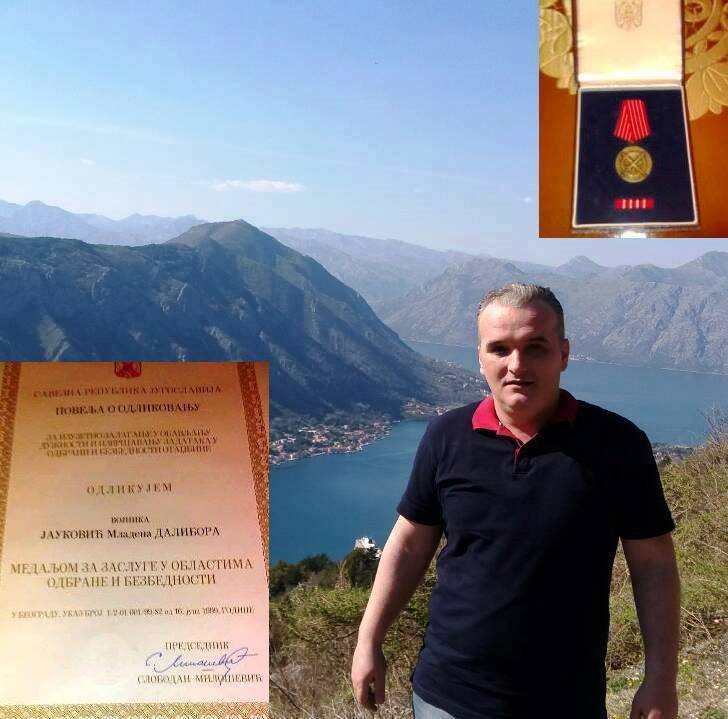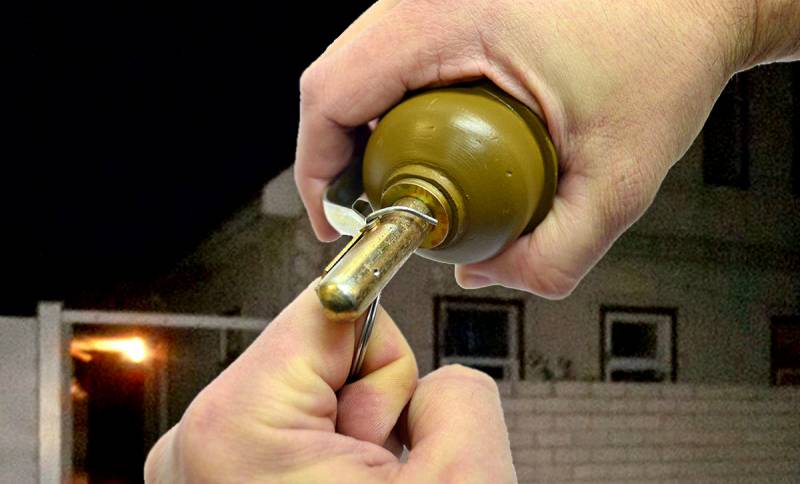Against NATO: US embassies blow up in the Balkans
February 22 in the capital of Montenegro, Podgorica, a loud explosion was heard near the building of the US Embassy. The man threw a grenade into the courtyard of the American diplomatic mission, after which he blew himself up.
As it turned out, this man was a former serviceman of the People’s Army of Yugoslavia, a veteran of the 1999 war, Dalibor Yaukovich. He participated in the defense of his country from NATO aggression, for which he received a medal "For Merits in the Field of Defense and Security of the Federal Republic of Yugoslavia" from President Slobodan Milosevic.
Yaukovich was born in Serbian Kraljevo, lived in Podgorica. Judging by the records that he left on his Facebook page, Dalibor was an ardent opponent of Montenegro's entry into NATO, the very organization that subjected Yugoslavia to brutal bombing in 1999.

Apart from Dalibor Yaukovich, no one was killed or injured. As The Associated Press reported, citing an anonymous source in the Montenegrin police, the body of the deceased was identified by his close relative.
The US Federal Bureau of Investigation has joined the Montenegrin police investigative actions. Law enforcement agencies are trying to establish whether Yukovich had accomplices. The security of all embassy buildings in Podgorica has been strengthened.
Prosecutor Lepa Medenitsa, who convened an extraordinary conference in connection with the incident, said that this was not a terrorist attack:
Indeed, this solitary act of protest, during which only the protester himself died, does not at all resemble a terrorist attack. Most likely, it was a self-sacrifice in the name of the fact that the people of Montenegro remembered the tragedy of 1999. Then the NATO bloc bombed Belgrade, Podgorica and many other cities and villages of the Federal Republic of Yugoslavia.
Since then, Yugoslavia has broken up. Now the authorities of the "independent" Montenegro are not only "friends" with NATO, but have also brought the country to this organization. In June 2017, the country officially joined NATO and became the 29th member of the alliance, which killed, in particular, children in Montenegro.
Last year, the Ministry of Defense of this country even banned the memory of those killed during the NATO bombing. The Montenegrin anti-NATO protests were brutally dispersed by the authorities. In addition, the issue of joining NATO was resolved even without a popular referendum, which was especially outraged by opponents of such a decision.
It is not surprising that there are people in the country protesting against this with such radical actions.
As it turned out, this man was a former serviceman of the People’s Army of Yugoslavia, a veteran of the 1999 war, Dalibor Yaukovich. He participated in the defense of his country from NATO aggression, for which he received a medal "For Merits in the Field of Defense and Security of the Federal Republic of Yugoslavia" from President Slobodan Milosevic.
Yaukovich was born in Serbian Kraljevo, lived in Podgorica. Judging by the records that he left on his Facebook page, Dalibor was an ardent opponent of Montenegro's entry into NATO, the very organization that subjected Yugoslavia to brutal bombing in 1999.

Apart from Dalibor Yaukovich, no one was killed or injured. As The Associated Press reported, citing an anonymous source in the Montenegrin police, the body of the deceased was identified by his close relative.
The US Federal Bureau of Investigation has joined the Montenegrin police investigative actions. Law enforcement agencies are trying to establish whether Yukovich had accomplices. The security of all embassy buildings in Podgorica has been strengthened.
Prosecutor Lepa Medenitsa, who convened an extraordinary conference in connection with the incident, said that this was not a terrorist attack:
At the moment, we have not found anything to talk about terrorism.
Indeed, this solitary act of protest, during which only the protester himself died, does not at all resemble a terrorist attack. Most likely, it was a self-sacrifice in the name of the fact that the people of Montenegro remembered the tragedy of 1999. Then the NATO bloc bombed Belgrade, Podgorica and many other cities and villages of the Federal Republic of Yugoslavia.
Since then, Yugoslavia has broken up. Now the authorities of the "independent" Montenegro are not only "friends" with NATO, but have also brought the country to this organization. In June 2017, the country officially joined NATO and became the 29th member of the alliance, which killed, in particular, children in Montenegro.
Last year, the Ministry of Defense of this country even banned the memory of those killed during the NATO bombing. The Montenegrin anti-NATO protests were brutally dispersed by the authorities. In addition, the issue of joining NATO was resolved even without a popular referendum, which was especially outraged by opponents of such a decision.
It is not surprising that there are people in the country protesting against this with such radical actions.

Information